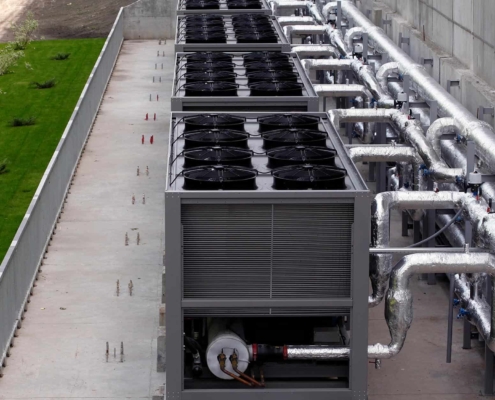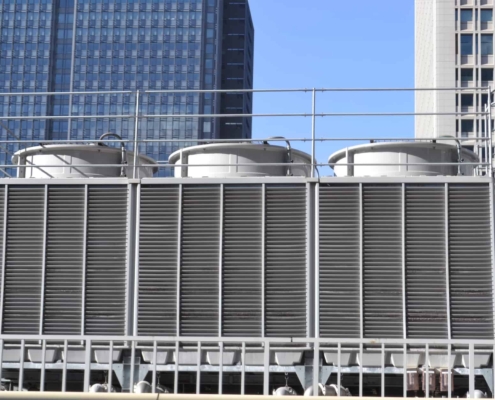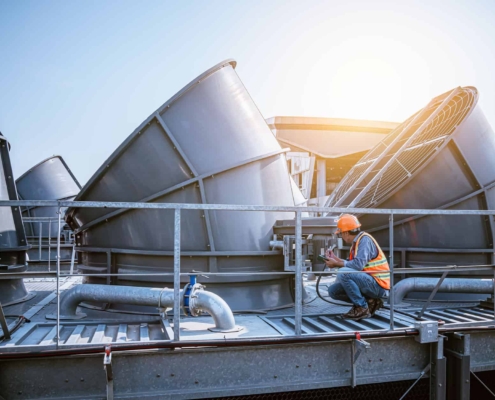 https://www.issmechanical.com/wp-content/uploads/2024/07/Chilers-system-for-data-center.jpg
1250
2000
Abstrakt Marketing
/wp-content/uploads/2024/04/svgexport-3-3.svg
Abstrakt Marketing2023-12-27 15:57:352025-07-10 11:26:32Data Center Cooling Strategies
https://www.issmechanical.com/wp-content/uploads/2024/07/Chilers-system-for-data-center.jpg
1250
2000
Abstrakt Marketing
/wp-content/uploads/2024/04/svgexport-3-3.svg
Abstrakt Marketing2023-12-27 15:57:352025-07-10 11:26:32Data Center Cooling StrategiesCommercial HVAC Troubleshooting: Reasons an AC Is Not Cooling
Commercial HVAC systems are crucial in maintaining a comfortable indoor environment. However, they sometimes fail to function as expected, risking productivity and comfort. One of the most common problems is an air conditioner not cooling properly. In this guide, we dive into reasons an AC is not cooling and provide in-depth insights into HVAC troubleshooting. Identify signs of an underperforming system, understand the importance of proper HVAC maintenance, and learn when to seek professional help.
Introduction to Commercial HVAC Troubleshooting
When it comes to commercial HVAC troubleshooting, understanding the common signs of trouble helps you make a well-informed decision regarding your commercial HVAC system. Whether you decide to DIY or schedule service with a professional, basic HVAC knowledge is always beneficial.
Signs of an Underperforming System
A commercial HVAC system that isn’t cooling enough or isn’t maintaining a consistent temperature is a red flag. Other signs include strange noises, excess humidity, frequent cycling, or a sudden rise in energy costs. Inconsistent airflow could also indicate an issue with your air handler unit. Identifying problems early will allow you to take the right action.
Importance of Proper Maintenance
Regular maintenance is crucial for your commercial HVAC system to function optimally. Cleaning and lubrication of components will extend the lifespan of your equipment. It also helps avoid costly breakdowns and maintain indoor air quality. Remember that dirty air filters can lead to poor indoor air, causing severe health problems for occupants.
Implications of Improper Maintenance
A poorly maintained HVAC system requires more energy to operate. This leads to larger utility bills, frequent repairs, and a higher possibility of system failures. Furthermore, improper maintenance can cause system components like the condenser and evaporator coils to fail prematurely.
Reasons Your AC Unit Is Not Cooling Enough
The main reasons an AC is not cooling may vary from simple user errors to complex mechanical problems. Below are some of the most common issues you may encounter.
Thermostat Issues
Thermostat issues often result from incorrect settings or malfunctions. A wrongly set or non-responsive thermostat can leave your AC unit struggling to cool your space. If your thermostat isn’t turned on, is set to heat instead of cool, or is set at a higher temperature than room temperature, your AC will not cool as required.
Dirt and Debris in the System
Dirt and debris can ruin the performance of your AC system. Dirty air filters block airflow, while clogged condenser coils decrease the system’s ability to expel heat. Dirt in the condenser or evaporator coils reduces cooling capacity and potentially results in your AC unit not cooling enough.
Issues with Refrigerant
Refrigerant is a substance in an HVAC system that removes heat from the air in your property. If your AC system is low on refrigerant or there’s a refrigerant leak, the system will struggle to cool the air. Both refrigerant leaks and inadequate refrigerant charge can lead to poor cooling efficiency.
Troubleshooting Common Commercial HVAC Problems
Troubleshooting common commercial HVAC problems can save you time and money. Below are some possible DIY solutions to common issues.
Fixing Thermostat Issues
If your thermostat has a digital display, make sure it’s powered on. If it’s blank or displays a low battery warning, replace the batteries. Also, make sure the thermostat is set correctly, as your AC will not cool if put to the wrong mode or temperature.
Cleaning Procedures for the AC System
To ensure optimal performance, clean your AC system regularly. This includes cleaning or replacing dirty air filters, unblocking condenser coils, and removing debris around the outdoor unit. Regular cleaning helps your system function effectively and can improve indoor air quality.
Handling Refrigerant Issues
If your HVAC system has a refrigerant leak or inadequate refrigerant charge, you’ll want to address this problem quickly. Remember, refrigerant isn’t something that runs out—if you’re low, there’s most likely a leak. This job is typically best for a professional, as handling refrigerant requires specialized knowledge and tools.
When to Call a Professional HVAC Technician
While some HVAC problems can be handled independently, there are situations where it’s best to call in a professional.
Identifying Serious HVAC Problems
If you’ve gone through all the basic checks and your AC unit is still not cooling, serious issues might be at play. Mechanical failures like a broken compressor or fan motor require professional assessment and repair. An expert can diagnose the problem and offer a sustainable solution.
Deciding Between Emergency Repairs and Standard Repairs
A lack of air conditioning in summer or heat in winter warrants a call for emergency service. So do work-stopping issues or anything that risks the health and safety of occupants. When in doubt, err on the side of caution.
The Role of Professional Technicians
An HVAC professional brings the expertise and tools to diagnose and repair your system efficiently. They’re trained to handle intricate mechanical and electrical components, ensuring the longevity of your system. They can also prevent minor issues from becoming major ones.
The Benefits of Professional Maintenance
Preventative maintenance can detect problems early, reducing your risk of unexpected breakdowns. Moreover, technicians ensure your system is running at peak efficiency, saving you money on utility bills. Together, these services increase the lifespan of your HVAC system, providing sustainable and efficient cooling for years to come.
Still Trying to Pinpoint Reasons an AC Is Not Cooling? Turn to ISS Mechanical
For over 20 years, we’ve helped hundreds of clients across industries in the Orlando area with their complex and common commercial HVAC problems. If your AC unit is not cooling enough or impacting indoor air quality, the ISS Mechanical team is happy to troubleshoot the problem and find a solution. Contact us today to schedule an assessment.
Related Postings
 https://www.issmechanical.com/wp-content/uploads/2024/07/Chilers-system-for-data-center.jpg
1250
2000
Abstrakt Marketing
/wp-content/uploads/2024/04/svgexport-3-3.svg
Abstrakt Marketing2023-12-27 15:57:352025-07-10 11:26:32Data Center Cooling Strategies
https://www.issmechanical.com/wp-content/uploads/2024/07/Chilers-system-for-data-center.jpg
1250
2000
Abstrakt Marketing
/wp-content/uploads/2024/04/svgexport-3-3.svg
Abstrakt Marketing2023-12-27 15:57:352025-07-10 11:26:32Data Center Cooling Strategies https://www.issmechanical.com/wp-content/uploads/2024/07/Commercial-HVAC-Troubleshooting-Reasons-an-AC-Is-Not-Cooling.jpg
1250
2000
Abstrakt Marketing
/wp-content/uploads/2024/04/svgexport-3-3.svg
Abstrakt Marketing2023-12-22 13:54:502025-07-10 11:26:32Commercial HVAC Troubleshooting: Reasons an AC Is Not Cooling
https://www.issmechanical.com/wp-content/uploads/2024/07/Commercial-HVAC-Troubleshooting-Reasons-an-AC-Is-Not-Cooling.jpg
1250
2000
Abstrakt Marketing
/wp-content/uploads/2024/04/svgexport-3-3.svg
Abstrakt Marketing2023-12-22 13:54:502025-07-10 11:26:32Commercial HVAC Troubleshooting: Reasons an AC Is Not Cooling https://www.issmechanical.com/wp-content/uploads/2024/07/How-to-Calculate-ROI-on-a-New-HVAC-System.jpg
1250
2000
Abstrakt Marketing
/wp-content/uploads/2024/04/svgexport-3-3.svg
Abstrakt Marketing2023-12-20 17:31:022025-07-10 11:26:33How to Calculate ROI on a New HVAC System
https://www.issmechanical.com/wp-content/uploads/2024/07/How-to-Calculate-ROI-on-a-New-HVAC-System.jpg
1250
2000
Abstrakt Marketing
/wp-content/uploads/2024/04/svgexport-3-3.svg
Abstrakt Marketing2023-12-20 17:31:022025-07-10 11:26:33How to Calculate ROI on a New HVAC System

